February 13, 2020
Statement of Karl A. Racine, Attorney General for the District of Columbia
Before the Committee on the Judiciary and Public Safety, Charles Allen, Chairperson
Office of the Attorney General, Performance Oversight Hearing, Fiscal Year 2019 to Fiscal Year 2020
February 13, 2020
Room 412
John A. Wilson Building
1350 Pennsylvania Avenue, NW
Washington, District of Columbia
Introduction
Good Afternoon Chairman Allen, Council members, staff and the residents of the District of Columbia. I am Karl A. Racine, and I have the honor and privilege to serve a second term as the District’s first elected Attorney General. This is the Office of the Attorney General’s (OAG) fourth Performance Oversight Hearing under your Chairmanship, and as always, OAG welcomes your committee’s strong oversight of our agency for Fiscal Year 2019 and Fiscal Year 2020. Indeed, our agency and the District benefit immensely from the scrutiny, check and balance, and constructive criticism that your Committee provides at this hearing and throughout the year in our regular interactions.
Several of my OAG colleagues are joining me today, including the majority of our office’s division managers.
Before getting started with my testimony, I want to recognize how fortunate our residents and District government are to have benefitted from the superlative and indefatigable contributions that Natalie Ludaway, the best Chief Deputy AG in the United States, has provided. Simply put, Natalie’s exceptional legal skill and judgment has been extraordinary. Any of our successes over the past five years are directly attributable to her dedication to District residents.
I am also joined by OAG’s General Counsel, Jason Downs, an immensely gifted lawyer, who will become Chief Deputy when Ms. Ludaway departs OAG for private practice at the end of February.
Mr. Chairman, we are grateful for the consistent investments and support that the Council has provided to OAG. Our objective is to ensure that we demonstrate a tangible return on the Council’s investment to the residents of the District and to the public treasury. Indeed, OAG lawyers and our professional staff have saved District taxpayers approximately $426.8M in would-be claims against the District in this reporting period.
Through our affirmative litigation, OAG returned over $15 million in restitution to harmed consumers and to the District’s coffers. We expect that several more millions of dollars will come in before the end of the fiscal year. I note that our over 90 percent success rate in litigation at the trial and appellate levels speaks volumes about the expertise and dedication of our lawyers and professional staff. I want to also remind you and District residents that at your and Chairman Mendelson’s request, OAG analyzed a complex legal issue regarding the extent to which DC Events can retain “excess reserves.” Working together with you and Chairman Mendelson, OAG returned more than $47 million to the District’s general fund. With a local budget of about $74 million, there can be no doubt that investment in OAG has resulted in strong returns for District residents and our public treasury.
Of course, the benefits of OAG’s work extends far beyond dollars and cents. The office promotes the public interest by using the law to protect our city’s most vulnerable residents. OAG has also sought to stand up for the District’s values on important national issues—protection of reproductive rights and standing up for immigrants, to name just two. And, as you know, we have partnered with you and your skilled team to enhance public safety by implementing innovative criminal justice reform.
OAG’s activities are comprehensively detailed in our responses to your committees’ thoughtful questions. Additional information can be obtained on OAG’s website at www.oag.dc.gov and in our upcoming Annual Report. Today, I will highlight a few of OAG’s accomplishments in FY19 and FY20.
Promoting the Public Interest
As Attorney General, I am responsible for using the law to promote the public interest. This duty is manifested by initiating investigations and bringing lawsuits on a broad range of issues, including but not limited to: holding slumlords and owners of nuisance properties accountable; standing up for tenants’ rights; protecting consumers; fighting wage theft; defending civil rights; and protecting our growing population of seniors. The common theme in these efforts is we use the power of the law to right wrongs and punish those responsible for causing them.. I’ll give you a few examples.
At OAG, we want to make sure District residents are getting a fair shake. That’s why, when we learned of allegations that Park 7 Residential, L.P., the owner of a Ward Seven apartment building, was charging tenants for water despite lease agreements stating that the cost of water was included in rent, we opened an investigation—and got a resolution. As part of a settlement, Park 7 Apartments is refunding at least $450,000 to more than 470 current and former tenants who were improperly billed for water, many of whom are low-income, senior citizens, or individual with disabilities. Park 7 will also be required to pay the District more than $200,000 for costs and expenses related to its investigation, and submit reports about water billing at the property to OAG for the next two years.
Last November, OAG announced a settlement that will require notorious landlord Sanford Capital to return $1.1 million to 155 tenants in Wards 5, 7, and 8 who were forced to live in squalor. For years, Sanford charged tenants rent but failed to maintain the property, forcing tenants to live in uninhabitable conditions with vermin infestations, inconsistent heat, broken plumbing, and dangerous fire code violations. Sanford is also required to pay a penalty to the District and, in accordance with a previous settlement, it must continue to divest ownership in all properties in the District and not work in the city’s residential housing business for at least seven years. The company once managed more than 20 properties in the District, and it is now winding down its last two properties.
As you know from the Committee’s hearing on Hate Crime Enforcement last year, District residents are deeply and rightly concerned with increased incidents of discrimination, bias-motivated violence, and other violations of human and civil rights. In 2019, OAG held five community listening sessions to learn about residents’ concerns regarding these matters. At each listening session, OAG used real-time polling and small group discussions to capture the experiences and views of the more than 90 community members from all eight wards who attended. We published the findings—detailing concerns about housing discrimination, racism, and bias-motivated violence against the LGBTQ+ community—in a public report titled “Community Voices: Perspectives on Civil Rights in the District of Columbia.” Our Civil Rights Section is using these findings to help define priorities as they work to bolster the District’s effectiveness in enforcing the Human Rights Act on a larger scale.
Thanks to the Council’s approval of additional full-time employees, this section won several victories in the last year, including a collaboration with Apartments.com and Zillow to eliminate discriminatory ads from their platform; and settlements with Renewal by Andersen—a window company that illegally refused to do business in certain District neighborhoods—and Curtis Investment Group—landlords who unlawfully discriminated against low-income renters. The Curtis settlement, announced today, includes the largest penalty received to date. This week, we announced a lawsuit against three real estate companies—DARO Management Services, DARO Realty, and Infinity Real Estate—and company executive Carissa Barry, for illegally discriminating against low-income District residents who receive housing assistance. We allege that the defendants forced housing voucher recipients to pay fees waived for non-voucher holders; placed voucher holders who fell behind on fee payments on track for eviction while failing to do the same for non-voucher holders; and engaged in discriminatory advertising.
We also proposed legislation that would expand OAG’s enforcement authority under the HRA, and strengthen protections for seniors and other vulnerable communities. That legislation was introduced to the Committee on Government Operations over a year ago. We finally have a hearing next week, and urge its passage.
Following constructive community feedback about OAG’s environmental efforts, and with investments from the Council, we have hired two environmental protection attorneys who are investigating and bringing cases against polluters in the District to fight for environmental justice. In December, our team filed a lawsuit against Greyhound Lines Inc. for allowing buses to idle at Union Station for longer than the legal limit, polluting the air and endangering the health and safety of commuters and workers. A joint investigation by OAG and the Department of Energy and Environment (DOEE) documented 50 Greyhound buses parked, stopped, or standing at Union Station with their engines running for longer than the three-minute legal limit, many for more than 20 minutes. With this lawsuit, OAG is seeking to collect at least $216,000 in penalties, reimbursement for costs of the investigation, and a court order to stop Greyhound from violating the District’s air pollution control laws moving forward.
In our first case enforcing the District’s Lead Hazard Act, we sued an apartment building owner for endangering the health and safety of District residents by exposing them to toxic lead-based paint. OAG is seeking a court order that would force the owner to properly eliminate the lead hazard at the property, and submit reports showing proof of repairs that will ensure safe conditions. OAG is also seeking reimbursement for DOEE for its investigative costs and monetary penalties of up to $25,000 for each day the lead hazard has not been fixed since the owner was notified of violations of the law.
As the District’s economy continues to expand, we have found that certain unscrupulous businesses—namely in the construction industry—are not complying with the District’s legally-required minimum wage, overtime, and sick leave laws. This practice is known as wage theft. Thanks to this committee and the Council, we have the resources needed to defend workers and punish companies that cheat.
For example, OAG sued Power Design, a national electrical contractor we have testified about before, and two of its labor brokers (JVA Services, and DDK Electric) for illegally misclassifying over 500 workers as independent contractors—a form of payroll fraud. OAG alleged that Power Design and its labor brokers failed to pay workers minimum wage and overtime, failed to provide legally required paid sick leave, and failed to pay District payroll taxes related to unemployment insurance. DDK Electric did not respond to the lawsuit and a default judgment was entered against the company in February 2019. Power Design and JVA Services contested OAG’s allegations, but the companies have now agreed to a Consent Order to resolve the lawsuit and avoid further litigation. Under the terms of the settlement, Power Design will be required to: (1) Pay $879,056 in back wages to workers; (2) Pay $1,820,944 to the District; (3) Pay $50,000 to support apprenticeships, job training, or workforce development programs; and (4) Implement measures to ensure compliance with the District’s worker protections. Power Design is also required to report to the District on these new policies and procedures, as well as the company’s use of subcontractors in 2020 and 2021.
Illegal misclassification is an issue that federal lawmakers are also struggling to address. I was honored to testify before the United States House of Representatives on our work and findings in this area. And I should note that while we modeled our wage theft enforcement after the New York and Massachusetts AG offices’ efforts in this area, other state AG offices are now modeling their work after ours.
We also use our resources to inform the public, especially young people, parents, and teachers, about the facts surrounding the scourge of human trafficking. We began this calendar year with Human Trafficking Awareness Month, putting a spotlight on the most common type of trafficking—sex trafficking, a terrible crime that forces victims to exchange sexual acts for anything of value.
As part of OAG’s ongoing work to educate young people and our community year-round on this issue, our office launched several new efforts to help people spot the warning signs of sex trafficking and promote resources for survivors, including: (1) Launching a public service announcement (PSA) campaign in hundreds of WMATA buses that highlights the problem of sex trafficking and how residents can seek help for themselves or someone they know; (2) Developing and distributing educational resources and tips, including a youth-friendly post card with trafficking warning signs and resources for survivors and steps parents can take to protect their kids from sex traffickers online; and (3) Training students and teachers about sex trafficking through OAG-led training sessions at Johnson Middle School, McKinley Tech Middle School, Sousa Middle School, and Woodson High School. OAG’s Anti-Trafficking Initiative works to connect youth at risk of sex trafficking in the child abuse and neglect system to support services. And OAG is now co-chairing the D.C. Human Trafficking Task Force, along with the U.S. Attorney’s Office for the District of Columbia.
The District of Columbia values seniors, and OAG is now substantially better-equipped to help these residents thanks to the Council’s investments in new full-time attorneys. In 2019, the Public Safety Division’s Domestic Violence & Special Victims Section filed 61 petitions for guardians and conservators for vulnerable adults who were being abused, neglected, or exploited, or who were self-neglecting. In response to issues presented to our office, the section’s elder abuse specialist crisscrossed the city meeting elders in their homes, at hospitals, and assisted living facilities to ensure that we learn directly from the seniors themselves about the issues they confront.
In a unique arrangement, Jennifer Mika, one of OAG’s Assistant Attorneys General now serves as a Special Assistant United States Attorney (SAUSA) at the U.S. Attorney’s Office, and has reviewed over 100 referrals regarding potential financial crimes against elders since starting there last February.[3] Together with an OAG investigator, this SAUSA has deepened the District’s relationships with numerous District and federal law enforcement partners, participated in numerous outreach events, and reviewed over 100 referrals of potential criminal wrongs from Adult Protective Services and other sources. She also identified the need to update the mandatory reporting requirements to APS included in our proposed amendments to the Protecting Children Through Mandatory Reporting Amendment Act of 2019, legislation which is pending in this Committee. Cases involving financial crimes can substantial time to investigate. But in less than a year, the team has already delivered results. Last fall, one investigation resulted in an 18-count indictment against a bank manager and personal banker who are alleged to have stolen over $80,000 from an elderly client who they befriended by visiting her after hours. In January 2020, the defendant in another case entered a deferred sentencing agreement and pled guilty to making unauthorized ATM withdrawals from the account of her elderly client with cancer. Just last week, the SAUSA won a jury trial in a case involving a home health aide who repeatedly stole money from an 80-year-old client with dementia. And I will point out that the criminal offense of Financial Exploitation of a Vulnerable Adult or Elderly Person was established by the Financial Exploitation of Vulnerable Adults and the Elderly Amendment Act of 2016 (Act), and OAG worked with Councilmember Anita Bonds and this Committee to enact that legislation.
In 2019, OAG also established an Elder Justice Section within the Public Interest Division to better protect the District’s seniors and vulnerable adults from financial exploitation. The Elder Justice Section is authorized to obtain civil fines and temporary or permanent injunctions against bad actors. EJS responds to residents’ calls and e-mails and can provide meaningful referrals to other agencies or area partners in cases that do not include allegations of financial exploitation. All other referrals are investigated by section staff and we bring cases that we can substantiate. The section has financial exploitation litigation pending that involves allegations that a long-term care nurse and his co-defendants conspired to use forged checks to take funds from two nursing home residents. In another matter, the section resolved a financial exploitation complaint without litigation, freeing an 80-year old District resident from a $51,000 car loan he entered after undue influence and fraud by the resident’s family member and a Maryland car dealership.
National
I also want to highlight some important national issues that impact our residents.
As you know, OAG is active in a host of actions to stop the Trump administration from dismantling protections that the District needs.
For example, I recently joined six other Attorneys General in filing a lawsuit to stop the Trump administration from threatening access to safe and legal abortion care for individuals who purchase health insurance through state health care exchanges. The Trump administration’s relentless attack on safe and accessible abortion care puts tens of thousands of District residents and workers in jeopardy of losing their health care access through our exchange. We filed this lawsuit to stand up for the rights of District women and families to make their own reproductive decisions.
Promoting the public interest also includes protecting the human rights of our immigrant neighbors, particularly children. I partnered with numerous AG colleagues to file a lawsuit opposing the Trump Administration’s new rule circumventing the Flores Settlement Agreement, which has governed the treatment of children in immigration custody since 1997. In the complaint filed in the U.S. District Court for the Central District of California, the coalition asserts that the Trump administration’s new rule eliminates several critical protections guaranteed by the Flores Settlement Agreement. In particular, the prolonged detention allowed by the rule would cause irreparable harm to children, their families, and the communities that accept them upon their release from federal custody. The lawsuit seeks to block the administration’s new rule and ensure the standards of care set by the Flores Settlement Agreement are followed.
In our Internet-connected world, residents need to know their online private data is secure. Because of this, OAG is currently litigating against Facebook—one of the largest corporations in the world. We allege Facebook’s lax oversight and misleading privacy policies enabled Cambridge Analytica to acquire over 340,000 District consumers’ data for political purposes. This lawsuit is the first filed by a State Attorney General against Facebook, and we are seeking monetary and injunctive relief, including relief for harmed consumers, damages, and penalties to the District. OAG won a major victory against Facebook’s motion to dismiss last June, and we are now proceeding with discovery.
OAG also filed a lawsuit against Marriott last year for deceiving consumers about resort fees that have boosted the hotel giant’s bottom line. To lure consumers, including tens of thousands of District consumers, Marriott advertised daily room rates that were lower than the true total price consumers were required to pay. By adding mandatory fees on top of advertised rates at the end of the booking process, Marriott reaped hundreds of millions in profits without appearing to raise prices. This kind of bait-and-switch advertising and other forms of deceptive pricing are unfair and illegal. OAG has already stopped Marriott’s effort to get this case dismissed. With this lawsuit, the office is seeking a court order to force Marriott to advertise the true prices of its hotel rooms up front, pay monetary relief to harmed DC consumers, and pay civil penalties to the District.
Beyond financial harms., our office is also looking out for the health and safety of District residents, particularly our youth. We filed suit against JUUL Labs, Inc., a major e-cigarette manufacturer, alleging that JUUL deliberately targeted underage consumers; failed to verify ages of purchasers; and deceived consumers about the content, strength, and safety of its products. As a result of JUUL’s conduct, roughly one-third of all e-cigarette users nationwide are middle and high school-aged kids—including thousands in the District. One principal of a District high school estimates that half of the school’s juniors and seniors use e-cigarettes. OAG is seeking to stop JUUL from engaging in these dangerous practices, and to impose civil penalties. Additionally, our office also issued subpoenas to eight other e-cigarette companies to investigate whether these companies engaged in similar practices, and to further prevent District kids from using these products. And our Community Engagement team will be leading outreach efforts to warn young people, parents, and teachers of the harms of vaping starting this month.
I am proud to say that our office and the New York State Attorney General led a group of 15 Attorneys General and New York City in a lawsuit to stop the Trump administration from eliminating food assistance for nearly 700,000 Americans. The lawsuit, filed in D.C., challenges a United States Department of Agriculture (USDA) rule that would limit states’ ability to extend benefits from the Supplemental Nutrition Assistance Program (SNAP), commonly known as “food stamps,” beyond a three-month period for certain adults. Should the rule take effect in April 2020, more than 13,000 District residents struggling to find work would be effectively cut off from vital nutrition assistance. OAG will continue the fight. I want to commend the DHS and its extremely competent director, Laura Zeilinger, for partnering with OAG in this lawsuit.
And I would be remiss without acknowledging Loren AliKhan, and her team, for the tremendous work they have done with our lawsuit against President Trump over his violation of the Constitution’s original anti-corruption law—the Emoluments Clauses. I urge the Council, Executive, and the public to pull up CSPAN and listen to Loren’s impressive oral argument in our historic case during a rare en banc hearing before the 15 judges of the 4th Circuit Court of Appeals. I have seen many oral arguments by many exceptional lawyers. Ms. AliKhan’s presentation was the best that I have seen in over 30 years of practice.
Like you, Mr. Chairman, I deeply believe in statehood for the District, and use every opportunity presented to advocate for statehood and full autonomy. Our Office of the Solicitor General (OSG) is not only boasting a victory rate above 90 percent for the cases they took on this year, they won a huge victory in getting the D.C. Court of Appeals to recognize that OAG, rather than USAO, was the appropriate prosecutor for the criminal offense of illegal dumping. This ruling opens the door to broader prosecutorial authority for OAG in a number of areas, and we are actively studying how to best use this new authority.
This is just a sampling of what we have in our robust pipeline of investigations and other legal actions underway on behalf of District residents. We have sought to complement our litigation through legislation introduced to strengthen consumer protection in the District, particularly around cyber threats and scams. I want to thank you for the hearings you’ve held on these important bills and working with our office on getting them passed.
Saving Taxpayer Dollars
Locally, our team strives to save District residents hard-earned tax dollars. In the past, I’ve come to the Council requesting additional resources in our Commercial Division, particularly related to tax issues. I am pleased to report that the Government Contracts Section was able to avoid $8.7 million in liability to the District by defending our contracting agency decisions. Moreover, our Tax and Finance Section closed 597 court cases to retain a projected $128.3 million in real property taxes, achieving a slight increase from the previous fiscal year.
I also want to highlight two major, decades-old, consent decree cases that have prevented two important District agencies, DYRS and CFSA, from fulfilling their essential functions. Yesterday, the Civil Litigation Division appeared before Judge Dixon regarding Jerry M, a 1986 case filed against the District on behalf of children confined in our juvenile detention facilities. OAG is pleased to have reached a settlement agreement with Plaintiffs. This is a major step toward concluding the District’s longest consent case, and it demonstrates how successfully the District has transformed the way it supervises and provides services to court-involved youth. And let me just say, I think the world of Director Lacey. The other case is LaShawn, which governs several aspects of the District’s child welfare system, including child protection services and the foster care system. In December 2010, the Court entered the Implementation and Exit Plan that set forth exit standards for the District to achieve. I am pleased to say that we entered settlement discussions in July 2019, and ultimately agreed on a plan to guide the termination of the lawsuit. Working with the Mayor and the Court to resolve these cases will save the District millions of dollars while also ensuring better services for our young people.
Improving Public Safety – Cure the Streets
While everything I have outlined thus far matters to District residents, there is nothing more important than our work to combat violence and keep the public safe. My heart goes out to all victims of crime in the District. We strive to make sure that they are heard, and we do everything in our power to make them whole. That is why we were particularly proud when the Network for Victim Recovery of DC bestowed us with their Community Advocacy Award, in recognition of our victim-centric approach to helping those impacted by crime.
Even if you never experience crime first-hand, the perception of safety is critical. That is why OAG consistently looks for evidence-based and creative ways to enhance public safety.
OAG’s Restorative Justice Program is one such innovative approach to addressing crime and conflict among youth in the juvenile justice system. Restorative Justice is an alternative to prosecution which empowers victims to express how they were affected by crime through mediation, holds offenders accountable, and requires them to accept responsibility and repair the harm they caused. The goals of each conference are to provide victims with greater voice and agency in the process; to build empathy, accountability, consequential thinking, and problem-solving skills in youth; and to resolve the conflict to ensure that it never happens again. The Restorative Justice Program is the first, and currently only, program located in a prosecutor’s office in the country. OAG’s Senior Data Analyst conducted the first recidivism check for youth who had participated in the restorative justice process. The data showed an improvement in recidivism rates for youth who went through restorative justice compared to a sample of youth prosecuted for similar offenses during the same time period. Our Senior Data Analyst found that 57 percent of youth who participated in a restorative justice conference did not recidivate, whereas just 42 percent of similar youth who were prosecuted did not recidivate. This represents a 15-percentage point improvement in keeping youth out of the justice system.
In January 2018, OAG created the ATTEND (Abating Truancy Through Engagement and Negotiated Dialogue) Program as a diversion mechanism to better serve the needs of parents who are subject to prosecution for not sending their children to school. ATTEND links them to community-based services to address underlying issues causing the chronic absenteeism. Some of the most common barriers include poverty (inability to pay for transportation), homelessness, parental mental health needs and parental substance abuse. Within two years, ATTEND resolved 389 cases with 100% mediation agreement reached rate. Beginning fiscal year 2020, OAG’s Public Safety Division resolved the backlog of referrals in the prosecution phase of this initiative and shifted to an in-school prevention model. Impressed with ATTEND’s results and OAG team’s work ethic, DCPS sought OAG’s partnership in leveraging ATTEND to meet the requirements of a $300,000 grant from the Office of the State Superintendent of Education (OSSE) for FY2020 to improve attendance, grades, and parent engagement. In the fall of 2019, OAG agreed to bring ATTEND to Ward 8, where the District’s most vulnerable children and families struggle with attendance. On December 3, 2019, started its ATTEND prevention model at Turner Elementary School. OAG expanded the original program to include monthly parent engagement workshops on topics relevant to parents’ needs, e.g., opportunities for employment, education, and expungements, to name a few. In the first month of the program, ATTEND has already seen a reduction in unexcused absences for those participants. For example, more than 50% of the current participants decreased to zero unexcused absences. Those with the highest number of unexcused absences at the time of referral have dropped to five and under. While it is still early in the prevention model stages, OAG is encouraged by the promising results ATTEND offers.
We also launched and expanded our Cure the Streets Pilot Program, which now has 60 frontline staff working at six sites: Trinidad and Trenton Park/Whaler Place, which we began operations in 2018, and the new sites we launched last December in Eckington/Truxton Circle, Marshall Heights, Bellevue, and Washington Highlands. I want to thank Mayor Bowser, Deputy Mayor Donahue, Chief Newsham, Director McFadden of the ONSE Office, and the Council, for our strong partnerships. At this point, I will turn to our Power Point Presentation (attached to testimony) to walk you through a survey OAG commissioned to better understand how District residents perceive safety, which will also help us measure the impact of the program. I would like to introduce Dr. Aysha Keisler, of Keisler Social and Behavioral Research.
[Dr. Keisler delivers presentation]
Conclusion
This testimony includes only a fraction of OAG’s achievements and ongoing work by our talented and dedicated OAG attorneys and professional staff since our 2019 hearing. Each year, I take this opportunity to communicate to you and all the members of the Council, our partners in the Executive, and most importantly the residents, how seriously we work every day on behalf of District. We hope to continue inspiring confidence in our work and our commitment to providing the District with the highest quality legal services. It is an honor and privilege to serve our residents. My team and I are pleased to answer any questions that the members of the Committee may have.
Content retrieved from: https://oag.dc.gov/release/testimony-performance-oversight-hearing-fy19-fy20.
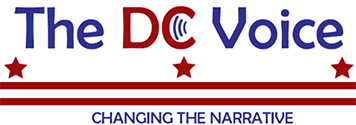










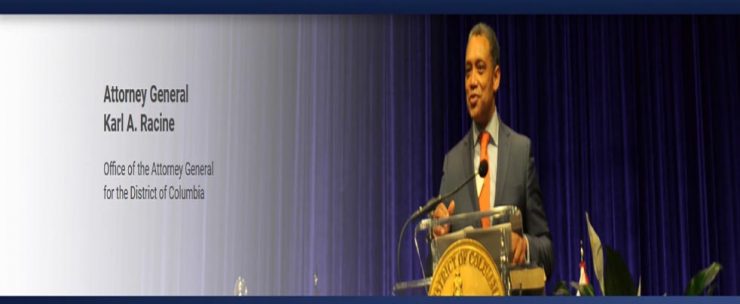
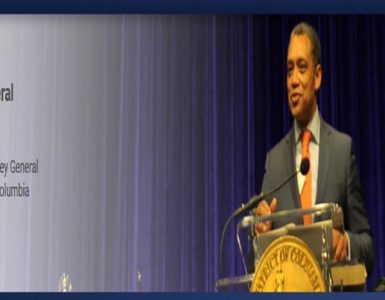



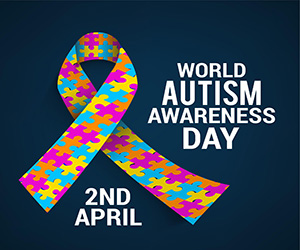
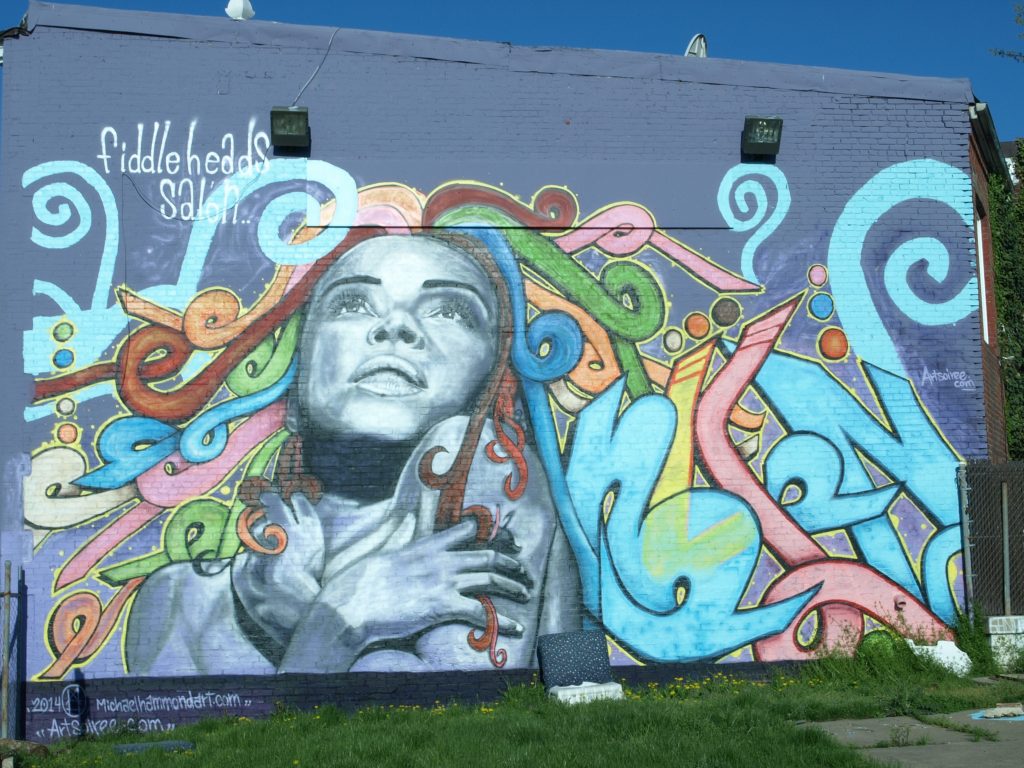
Add comment